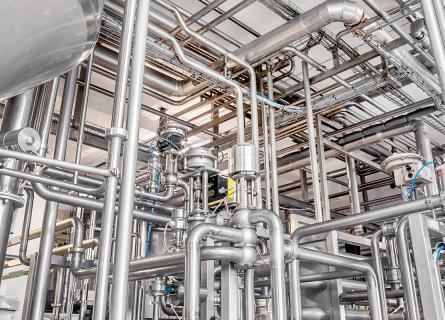
Advanced biofuel markets
Changing energy and climate policies in the EU have discouraged investments in advanced biofuel production prior to the Renewable Energy Directive revision (RED II) launched in 2018.
The Renewable Energy Directives (RED II) sets specific targets and limitations for liquid biofuels use for 2021-2030, which each member state needs to adopt into national legislation by the end of this year. For the first time at the EU level, RED II defines a binding subtarget for advanced biofuels, which refer to fuels made from a specific list of sustainable feedstocks - including lignocellulosics, algae, municipal solid waste, among others. The EU Green Deal is likely to bring another wave of changes also to RED II, but the ambition level is not expected to decline.
AFRY supports the Finnish government
AFRY has been at the forefront of advanced biofuel development for over a decade. In addition to our engineers, who have unmatched experience in advanced biofuel investment projects, our mnagement consultants have been advising, for instance, the Finnish government on which is the most feasible and cost-efficient way to implement RED II into national law. Finland was one of the first countries to revise biofuel policies and to introduce advanced biofuel blending mandates through to 2030. As a follow-up to the successful advisory in road transportation, AFRY will have the privilege to continue supporting the Finnish government in autumn 2020, this time evaluating the possibilities to introduce a similar blending mandate also for aviation fuels.
Liquid biofuels - robust reduction enablers
RED II targets correspond to a liquid biofuel demand of almost 40 million tonnes in the EU by 2030, of which advanced biofuels contribute as much as 10 million tonnes. However, the biofuel demand in Europe is not limited to what is set forth in RED II. Emission reductions in the transport sector are also defined in the Effort Sharing Regulation (ESR), which aims at 30% overall greenhouse gas emission savings for all sectors outside the emission trading system, such as transport, buildings, agriculture and waste sectors. Liquid biofuels are among the few existing and robust means to lower these non-ETS emissions, which has made several member states to consider implementing significantly higher biofuel blending rates than RED II in order to meet the Effort Sharing Regulation targets. Finland has biofuel blending mandate of 30% in road transportation fuels for 2030, while Sweden has been discussing even more ambitious targets above 60% for the diesel pool.
AFRY’s team has developed proprietary demand models for the biofuel outlook in specific EU countries. Eight leading countries – Germany, France, Italy, the UK, Spain, Poland, Sweden, Finland – alone represent close to 50 million tonnes of the demand for liquid biofuels in 2030, more than the entire EU-28 RED-targets.
European refiners predict significant investment
FuelsEurope, the European petroleum refining industry association, launched its fresh view on low carbon liquid fuels in June 2020. The publication is an outcome of a 3-year project and represents the views of 40 companies operating refineries in the EU. FuelsEurope members cover almost 100% of the petroleum refining capacity in the EU, and more than 75% of motor fuel retail sales. FuelsEurope’s views are very much in line with AFRY’s projections on future demand. The association predicts biofuel production based on hydrotreated vegetable oils (HVO) to double from 5 to 10 million tonnes between 2020 and 2030 in the EU, whereas lignocellulosic fuels production is expected to reach up to 4 million tonnes by 2030, representing EUR 25 billion in capital investments. Should the rate of adoption of electric vehicles exceed current trajectories, it would only make biofuel targets more achievable. Electric vehicles are primarily targeting passenger cars, whereas the largest volumes of advanced biofuels are used in heavy transport.
Existing producers up for attractive margins
The EU demand for advanced ethanol and drop-in fuels cannot be met with currently announced projects, even globally. In advanced ethanol production, only few flagship projects have been pursued throughout the world, facing major challenges in ramp up, capacity utilisation and production economics. However, hopes are high for the second wave of investment projects that are due for commissioning in the next 2-4 years. Simultaneously, the advanced drop-in biofuels are getting a lot of attention as they lack the drawbacks related to blend wall, lower energy content and taxation. As the HVO feedstocks are increasingly limited, more lignocellulosic projects are needed throughout Europe. Many wood-based drop-in fuel technologies are still under development. The same flagship projects are triggering investment decisions and, have thus got quite a solid foundation.
Despite the strong market outlook, first of a kind advanced biofuel projects struggle to succeed with project-based financing. The investment costs of wood-based pyrolysis or gasification technologies are comparable to greenfield pulp mill investments, and advanced biofuels have their own pricing mechanisms, which are not pegged to conventional first generation biofuels. Owing to the turmoil in EU and national policies, producers face difficulties in securing long-term off-take contracts. Owing to the challenges in the supply ramp up, advanced biofuel business is expected to generate attractive margins to producers who can reach stable production with a high utilisation rate.
All in all, advanced biofuels have a very strong market outlook owing to EU policies and premium pricing. The demand for liquid biofuels will grow by over 30 million tonnes in Europe in the coming decade, creating a supply challenge and opportunities for new entrants. The challenges lie in first of a kind technologies and the bankability of the projects, which are both areas where AFRY is pleased to support our clients.







